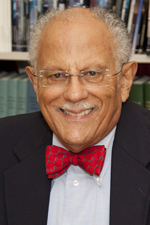Theme: Environmental Science

Joe Beckman Oral History Interview
Life history interview conducted by Chris Petersen.
September 15, 2015
Joe Beckman (b. 1953), a Distinguished Professor of Biochemistry and Biophysics, has
been a Principal Investigator at the Linus Pauling Institute and a member of the OSU
faculty since 2001. A leader in the study of neurodegeneration, Beckman has spent
more than twenty years investigating the cause of, and searching for a cure for, amyotrophic
lateral sclerosis (ALS, or Lou Gehrig's Disease). Since 2002, Beckman has also served
as Director of OSU's Environmental Health Sciences Center, an organization that works
to foster and promote research on the impact of the environment on human health.
His interview focuses on his scientific education and military service; his breakthroughs
researching neurodegenerative disease; promising new studies that may result in an
effective treatment for ALS; and the institutional evolution of the Linus Pauling
Institute, the Environmental Health Sciences Center, and OSU itself.

Andy Blaustein Oral History Interview
Life history interview conducted by Chris Petersen.
February 3, 2017
Andy Blaustein (b. 1949) is a Distinguished Professor of Zoology who has worked at
OSU since 1978. A leading scholar of animal behavior and chemical ecology, Blaustein
has conducted especially important work on amphibian deformities and population declines,
and on host-pathogen biology. Formerly the director of OSU's graduate program in Environmental
Science, Blaustein is also a long-time editor of the journal Conservation Biology. In his interview, Blaustein traces his career in research and teaching, and shares
his institutional memories of four decades spent at Oregon State University.

The Lives of International Students
Three life history interviews conducted by Chris Petersen.
March 3 - 6, 2015
In 2015, Oregon State University served as a home away from home for over 4,000 international
students hailing from 107 different countries. Over the course of three interviews
conducted in March 2015, the experiences and perspectives of four current OSU international
students were recorded, with particular emphasis paid to changing perspectives on
U.S. culture, contrasting systems of education around the world, and the major social
and cultural adjustments required of international students studying at Oregon State.
The international students who shared their stories are Jenny Urbina, a Ph.D. candidate
from Colombia; Kong Zheng Yeang, an undergraduate from Malaysia; Andrea Jara, also
a Ph.D. student from Colombia; and Chidi Okonkwo, a master's candidate from Nigeria.

Robert Tanguay Oral History Interview
Life history interview conducted by Chris Petersen.
April 21, 2017
Robert Tanguay (b. 1966) is a Distinguished Professor of Molecular Toxicology who
joined the OSU faculty in 2003. The Director of the Sinnhuber Aquatic Research Laboratory,
Tanguay has built an international reputation for his use of zebrafish as a model
for analyzing the toxicological impact of thousands of different chemical compounds.
In 2009, his laboratory received a major grant from the Environmental Protection Agency
that was used to conduct the largest in vivo toxicological study to date - an examination
of some 1,200 compounds yielding data on half a million zebrafish. Tanguay also speaks
regularly to both public and private entities on the biosafety of various commercial
developments, including flame retardants and the practice of fracking. His interview
traces his career in science with particular attention paid to his zebrafish studies
at OSU.

Warren Washington Oral History Interview
Life history interview conducted by Chris Petersen.
May 29, 2015
Warren Washington (b. 1936) earned two degrees from Oregon State College, completing
a B.S. in Physics in 1958 and, two years later, a M.S. in General Science with a concentration
on meteorology. Washington subsequently went on to a career at the National Center
for Atmospheric Research (NCAR) that has spanned more than five decades, a time period
during which he has established himself as a leading thinker on climate modeling.
An adviser to five different presidential administrations, Washington received the
2010 National Medal of Science for his achievements as a scientist and administrator.
Washington and his colleagues at NCAR also made fundamental contributions to the work
of the Intergovernmental Panel on Climate Change, a body that was awarded the Nobel
Peace Prize in 2007 for its efforts to create an "ever-broader informed consensus
about the connection between human activities and global warming." Washington's interview
focuses on his experience as an African American youth growing up in Oregon; the progression
of his research in the atmospheric sciences; his experiences operating in Washington,
D.C.; and his thoughts on the issue of climate change.
